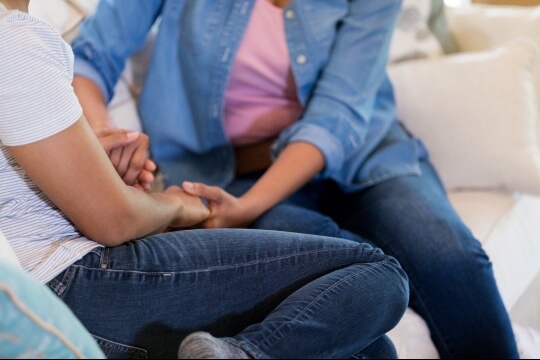Parenting with Mesothelioma: Talking to My Children About My Diagnosis

As a parent, there will come a time when you will have to have serious talks with your children. Talks about bullying, the birds and the bees, and the ultimate, “What do you want to do with your life?” talk.
No one ever prepares you for these discussions, and if there’s a manual out there I haven’t found it yet. These talks are pretty normal, and as a mom of four I knew they were bound to happen. But what I didn’t know was that one day I would be telling my kids I had mesothelioma cancer.
I believe that everything happens for a reason. When I was diagnosed with peritoneal mesothelioma I had just had my first son five months prior. So, at that time, he wouldn’t have understood even if I tried to tell him.
This was helpful for me because I had a long time to figure out how I would tell him. As a matter of fact, after my HIPEC surgery I was told I couldn’t have any more kids due to the heated chemotherapy. Never in a million years would I have thought I would have three more children.
When It’s Time to Talk About Cancer
My husband and I are always honest with our kids and we like to keep them in the loop on what’s going on. Kids are very inquisitive and they will start asking questions even before you attempt to let them know what’s happening.
We told my oldest son Caleb at an early age; he was about 3 or 4 years old, if I remember correctly. Even though I had already gone through the surgery and treatment, we felt it was a good time to tell him being I was still going to the doctor for follow-ups.
When talking to children it’s helpful to keep in mind these three things:
- Speak in plain language. It’s important to break things down so they can understand.
- Be optimistic. Even though things may seem bleak, it’s vital to remain positive.
- Sum it up. You don’t have to tell them everything from A to Z. It’s not good for them to be overloaded with information and overwhelmed emotionally.
Seize the Moment
Kids are pretty smart, and they can sense when something is going on. At one of my follow-ups it was time for me to drink the contrast dye for the CT scan. Just to let you know, I always had a hard time with this because of the taste.
Caleb asked what I was drinking and could he have some. And I figured, OK, this is the time to tell him. I said, “Mommy is drinking this medicine for a test to make sure I’m still cancer-free.” Of course he said, “What is cancer?” I told him it was something in my stomach that was making me sick but I didn’t have it anymore. So every time he would ask I would tell him just that and reassure him I would be OK.
And that was that until my other three came along.
My kids love to chat with one another about various topics. I didn’t know I would be talking about me being a cancer survivor while riding in the car. But the conversation came up when a commercial about mesothelioma popped up on the radio.
Caleb said, “Hey y’all, that’s what mama had.” My other kids were like, “Huh? He said mama had mesothelioma cancer.” They said, “Did you mama?” And that’s when I told them yes, I did, but I’m cancer-free now. I explained I had surgery to get rid of it and that I’m healthy now and reassured them I would be OK.
Keeping Your Kids in the Know
My children are pretty knowledgeable about mesothelioma. They share with their friends, teachers, etc. that I am a cancer survivor. When I have doctor appointments they ask me if it’s for the mesothelioma and I’m pretty honest with them. They have all been with me through this journey of appointments and such.
When my husband was diagnosed with cancer we were both more prepared to tell the kids. We used the three hints I mentioned before: Speak in plain language, be optimistic and sum it up.
It’s never easy to tell your kids that you have cancer, but just in case that day comes, remember to tell them when you feel the time is right.
Everyone’s situation is different, but it’s vital to be upfront and honest. Children are impacted by their parents’ emotions and they can sense when something is off.